Description
The painting "a child" (1904) by Theo Van Doesburg, an evocative work that encapsulates both the essence of childhood and the beginnings of what would later become a series of artistic experiments of the author himself, provides a penetrating look at The aesthetic sensitivity of the Dutch painter. Although Van Doesburg is mainly known for his role in the STIJL movement and his innovations in abstraction, this early work belongs to a previous context in his career where naturalism still played a relevant role.
In the work, a small child appears in a seemingly serene pose, focused on the pictorial space. The figure is marked by a use of defined contours that protect their integrity against a more dispersed fund. This contrast between the clarity of the figure and the indefinition of the environment reflects the author's search to explore the identity and innocence of childhood, encapsulating a moment that is both simple and deep. The child's gaze, towards a point outside the painting, It suggests introspection, inviting the viewer to reflect on the inner world of childhood.
The colors used in "a child" are faint vibration, predominantly the ocher and blue tones that were previously associated with the post -impressionist current. This subtle use of the palette verbalizes a contained emotion, while showing the influence of natural light on the child's skin, and evokes almost luminous quality. Each line seems to measure with precision, which gives the work a visual clarity that attracts the viewer and reinforces the emotional impact of the representation.
Although this piece is less known compared to Van Doesburg's maturity works, it represents an interesting link with its future experimentation, marking the transition from its work towards a more radical and geometric abstraction, which would be explored intensely in the following decades. This painting can become a bridge that connects your youth concerns with the most advanced manifestations of your Stijl career, where order and harmony became fundamental pillars.
It is relevant to mention that Van Doesburg also had a deep interest in color and composition theory, elements that already begin to glimpse in this work through the interaction studied and harmonious between the forms and the tones it uses. While "a child" is a relatively direct representation, it can be interpreted as a precursor to the exploration that would continue in his subsequent works, where he strives for a formal balance that transcends the mere representation of the subject.
Thus, "a child" is not just any portrait; It is a testimony of the artistic evolution of Theo Van Doesburg, a look at his inner world and a reflection of the concerns that led him to become one of the main exponents of the artistic avant -garde of the twentieth century. This work, even with its apparent simplicity, encloses the complexity of the artist's search for making sense of representation through a new worldview. In this sense, each element of the painting invites the observer to decipher not only the character of the retired child, but also the relationship between art and life, a dilemma that Van Doesburg in his career would continue to explore without rest.
KUADROS ©, a famous paint on your wall.
Hand-made oil painting reproductions, with the quality of professional artists and the distinctive seal of KUADROS ©.
Art reproduction service with satisfaction guarantee. If you are not completely satisfied with the replica of your painting, we refund your money 100%.

